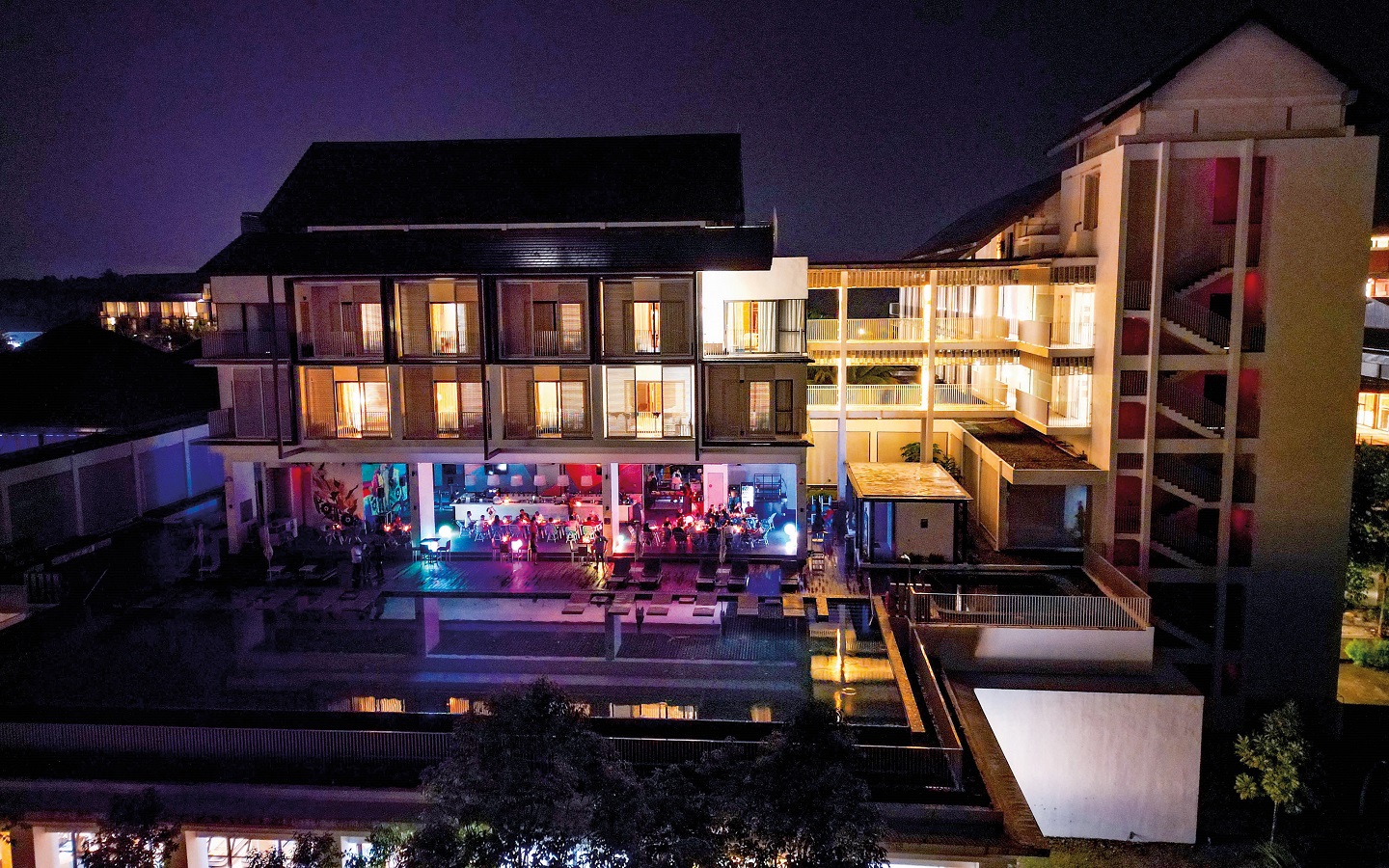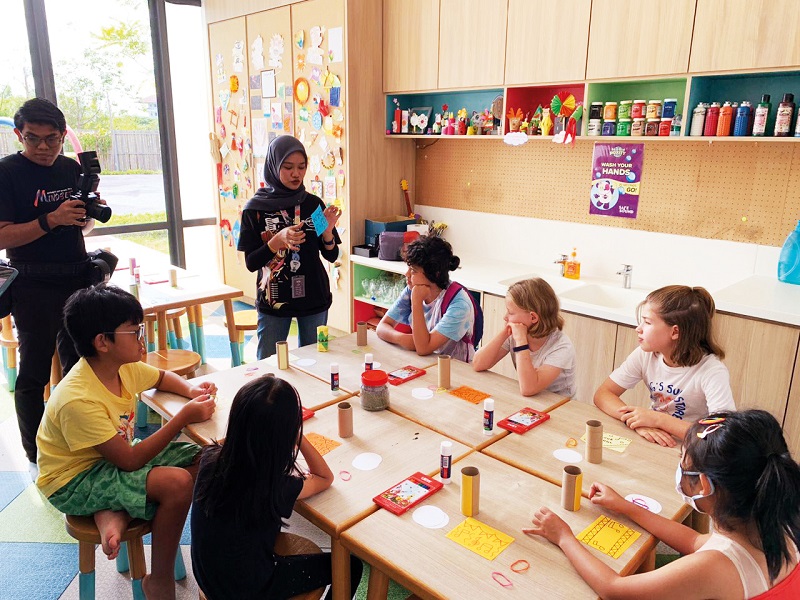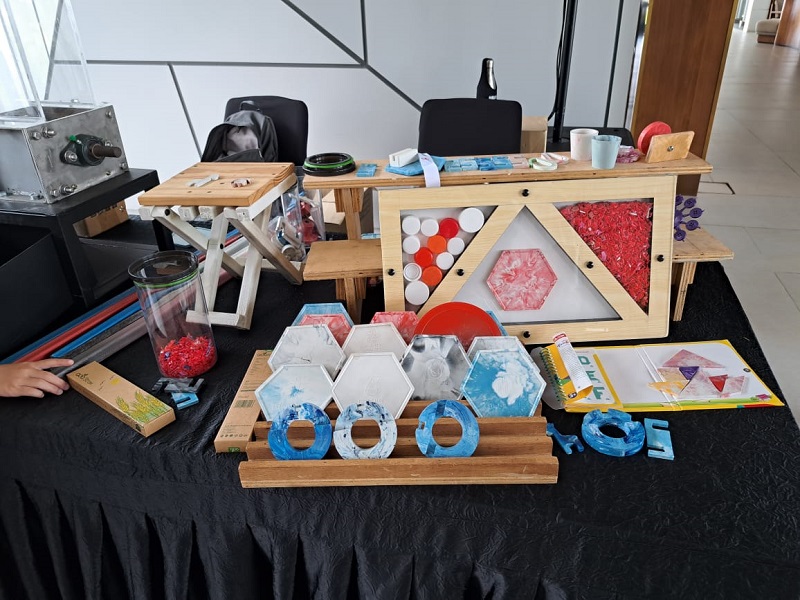
The hotel switched off its lights during Earth Hour to build awareness of the need for climate-change action (All photos: Hard Rock Hotel Desaru Coast)
Behind the façade of the Hard Rock brand, which is the rocker and music, is its soft side, the Hard Rock Heals Foundation. Founded in 2016, this platform unites global initiatives and local events aimed at making the world a better place.
Hard Rock Hotel Desaru Coast (HRH Desaru) in Johor marked Earth Hour over the weekend of March 25 with activities that shed light on one of the group’s mottos, “Save the Planet”.
“What we do behind the scenes and in front of guests is in line with sustainability,” said general manager Murray Aitken, before guests sat down for dinner in the dark for an hour.
Throughout the years, Hard Rock International has partnered the World Wildlife Fund (WWF) to host events and switch off lights to build awareness of the need for climate-change action. This year’s theme for the annual movement, “The Biggest Hour for Earth”, focuses on educating the community on the importance of minimising waste and being kinder to the Earth.
When Aitken joined HRH Desaru two years ago, one question he asked himself was: “How do I translate Save the Planet at a property, on the ground, so that it’s not just a motto on the wall or a piece of paper?”
The lightbulb moment came on his third day at work: plastic straws had to go, immediately. Aitken knew he could never remove single-use plastic completely, but narrowing the focus to meaningful activities was a good start.
“Straws are a minute part of the equation but they’re an indication of many other things, like our takeaway packaging. We buy biodegradable, compostable and slightly more expensive materials, but you have to invest to remove problems in the world today,” he said when welcoming guests and various organisations gathered to celebrate Earth Hour.
Without chest-thumping, Aitken said that while many others are doing their part for sustainability, the hotel’s efforts are being highlighted. “The environment allows us to do a lot. We seem to have more opportunities to be able to achieve a lot.”
children_engaged_in_activities_at_hrh_desarus_roxity_club.jpg

He then shared photos showing the shameful things man has done to the planet, such as deforestation, even on Mount Everest, and oil spills that killed fish and caused lots of damage to the ecosystem. From what we have been doing wrong, he moved on to how we can set things right.
“It starts with you. There are a lot of things we can do — choose more sustainable and less processed food, use a canvas bag and volunteer to do conservation work. You don’t have to become radical about it.”
Speaking for himself, Aitken realised over a decade ago that “you can make a lot of noise but people are going to switch you off”. So he amped down the noise and began implementing things at the hotels and restaurants he worked in, “keeping a little quiet and speaking when I needed to. I started to mature a bit about sustainability and stopped reposting things that were not meaningful”.
Education boosts awareness and we can let children know why they should not litter or how to go for something more sustainable than plastic, said this father of five. At Hard Rock’s Roxity Kids Club, young guests hang out, play and learn about reducing waste and making arts and crafts from recycled materials, among them toilet paper rolls.
When HRH Desaru’s housekeeping team puts in a new toilet roll in the guest room, the half-used one goes to the staff toilet. Key cards are made of wood, not plastic, to prevent them from ending up in landfills. Every quarter, a company comes to pick up e-waste, from tables to printers and batteries, for recycling.
There are 25 water stations around the hotel and guests can top up their water bottles — there are two big ones in every room — before going out. Everpure filters fitted in the rooms provide potable water. “It’s from the US and one of the best filtration systems around. We’re spreading the word to other hotel colleagues and they are snapping it up. We’re pushing this company that started something good to get business and that’s how it works,” Aitken said.
Reuse and recycle. We can also refuse to take things that are plastic, he believes, or start influencing people at the workplace. “Each time you do something, it may not seem like much. But if eight billion people save [some water] in a day, it makes a lot of difference.”
reusing_plastics.jpg

Walking the talk, last year HRH Desaru expanded its focus on single-use plastics by “looking at how we eat and how we buy” and working with its purchasing director and suppliers.
The vegetable supplier was told, “We give you baskets and you stop buying plastic bags.” The fish supplier has been given Coleman cooler boxes so he will stop using the Styrofoam boxes he brings and leaves behind because they are wet and smelly.
“You have to work with suppliers, and chef Halim is working to get things implemented,” Aitken said. “Sometimes, they do it, then stop. Sometimes, there is a new boss or [there will be a different] guy who brings the stuff ... You have to have patience.”
Meanwhile, the hotel does what it can, especially on waste management, one of its five goals for 2023. Waste in the room and kitchens is properly sorted before being handed to the company that comes to collect it. They do not have the time to segregate the waste and it just costs too much, Aitken explained.
HRH Desaru also targets and reduces water consumption. It is already harvesting rainwater to water its plants and do various other things on the property. It will install solar panels on the roofs of its buildings and, eventually, the parking lot.
Instead of throwing away torn or stained bedsheets, a seamstress cuts them up and turns them into shopping bags dyed using food dyes. These are given to the community, such as schools and orphanages. Similarly, towels are cut up and put to new use by the chefs.
The hotel launched its Hornbill Villa project last year, as those birds are frequently spotted in its vicinity. Made of wood and hung from trees on its grounds, the “villas” will provide homes for the females to nest and breed. The hotel also does composting and has a small herb garden, where its staff volunteer to do the messy work.
hrhdc_-_executive_chef_halim_showcasing_produce_from_a_community_garden.jpg

“The fun part is harvesting your own food and using it in the staff restaurant,” Aitken said. The volume is not high, but that is immaterial. “The point is not to try to replace a supplier, but teach people how they can do it. I do it at home, too. My parents-in-law love gardening and we don’t have to buy lime, lemongrass or pandan leaves — they’re so easy to grow.”
What the hotel cannot do, it supports by inviting companies invested in sustainability to share what they do.
Precious Plastic Malaysia and ADA Biotech joined in the Earth Hour celebrations at Desaru, as did the Breast Cancer Support Group Johor Bahru, which brought handmade bags and toys for sale.
Precious Plastic is part of a global community that designs and builds machines to fight plastic pollution by turning such waste into beams for furniture or smaller items such as buttons, which have been picked up by bespoke tailors.
ADA Biotech, set up in 2017 and based in Mak Mandin, Butterworth, aims to “save the planet with a little thing” — 100% biodegradable straws made from rice and plant-based straw. This little item is going places: ADA now supplies to Singapore, Indonesia, the Philippines and Fiji Island. “The five-star hotels in Fiji use our straws,” founder Y C Tan said proudly. Which goes to show anyone can start small and do his part for sustainability.
This article first appeared on Apr 17, 2023 in The Edge Malaysia.


